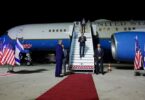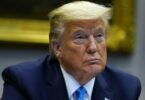F.P Report
WASHINGTON: Diplomacy is back at the center of foreign policy, and we are working to strengthen America’s relationships with our allies as well as the relationships among them and none are more important than Japan and the Republic of Korea, Sung Kim, Acting Assistant Secretary Bureau of East Asian and Pacific Affairs said on Saturday.
To highlight the vital importance of our three countries the United States, Japan, and Korea in promoting peace, security, and prosperity in the Indo-Pacific region and beyond, Secretary of State Blinken and Secretary of Defense Austin will make their first overseas visit to Tokyo and Seoul from March 15th through 18th, Kim mentioned.
In Tokyo and Seoul, Secretary Blinken will work with leaders to expand cooperation on tackling COVID-19, strengthening deterrence against regional threats, and addressing climate change, as well as enhancing trilateral cooperation on a broad range of global issues, including denuclearization of the DPRK, he added.
He further mentioned that Blinken will also discuss our efforts to promote high standards for human rights and fundamental freedoms, establish effective international rules, and promote accountability for countries like China when they fail to adhere to their international commitments and obligations.
On March 16th and 17th in Tokyo, Secretary Blinken will meet with Foreign Minister Toshimitsu Motegi and other senior officials. Secretary Blinken and Secretary Austin will attend the U.S.-Japan Security Consultative Committee 2+2 meeting hosted by Foreign Minister Motegi and Minister of Defense Nobuo Kishi. Secretary Blinken will also meet virtually with business leaders and women entrepreneurs to highlight the importance of U.S.-Japan economic ties, Kim underlined.
On March 17th and 18th in Seoul, Secretary Blinken will meet with Foreign Minister Chung Eui-yong and other senior officials, he said.
Secretary Blinken and Secretary Austin will attend a U.S.-ROK Foreign and Defense Ministerial, or 2+2, hosted by Foreign Minister Chung and Minister of Defense Suh Wook. Secretary Blinken will also meet virtually with Korean youth leaders to discuss the importance of the U.S.-ROK alliance in promoting peace, security, and prosperity in the Indo-Pacific region and across the globe, he added.
On the other hand, David F. Helvey, Acting Assistant Secretary of Defense for Indo-Pacific Security Affairs commented that the Biden administration has made clear the criticality that attaches to promoting peace, security, and prosperity in the Indo-Pacific region and beyond through engaging with and investing in alliances and partnerships; and strengthening our foundation at home to maintain our innovation edge and to rebuild our industrial base, he mentioned.
The upcoming trips by the Secretaries of State and Defense signal the importance of our alliance and partner relationships, which are a real force multiplier in advancing our shared interests in the United States commitment to a rules-based international order, an order that places all nations on a level playing field and holds them responsible for preserving the principles that underpin it, Helvey remarked.
Referring to free Indo-Pacific, Helvey remarked that we’re committed to upholding a free and open Indo-Pacific region where all nations, large and small, are secure in their sovereignty and pursue economic opportunity, resolve disputes without coercion, and have the freedom to navigate and fly consistent with international rules and norms.
He also highlighted that the region is facing mounting pressure from People’s Republic of China and the continued threat from North Korean nuclear weapons and ballistic missile programs, this trip sends an important signal of resolve to work with allies, partners, and like-mindeds to promote a peaceful, stable, and resilient order that benefits us all.
Secretary Austin will be joining Secretary Blinken for the Security Consultative Committee meeting, or 2+2, in Japan, the highest platform for alliance management that we have with Japan. Our alliance is the cornerstone for peace and prosperity in the Indo-Pacific, Acting Assistant Secretary for Indo-Pacific security affairs stated.
Secretary Austin, likewise, will join Secretary Blinken for a 2+2 meeting in the Republic of Korea. Our alliance with South Korea is the linchpin of peace and stability not only on the Korean Peninsula but across the region, he mentioned.
In addition, he’ll meet with Minister Suh Wook and other officials to review alliance priorities and the readiness of forces there to ensure that we maintain an effective combined deterrence and response capability, Helvey stated.
Secretary Austin will travel onward to India, an important strategic partnership that involves cooperation with likeminded nations committed to protecting the rules-based international order.
In India, he’ll meet with Minister Rajnath Singh and others to discuss operationalizing the major defense partnership that we have with India, including through enhanced information sharing, regional security cooperation, defense trade, and cooperation in new domains.
Helvey also commented that the Secretary has also signaled a very early interest in focusing the department on China. He has identified China as the pacing threat and the pacing challenge for the department.
He’s done things like establish the task force that Dr. Ely Ratner is running to look at that. And I think his initial steps kind of demonstrate that this is going to be an area of continued focus, and the participation in this trip, follow-on travel to India, will provide an opportunity for exchange of views early on with key allies and partners about how we can work together and expand cooperation to support a regional – pardon me, a rules-based international order, and continue developments of these critical relationships which enable us to do that, he mentioned.
On the other hand, Ambassador Sung Kim mentioned that there is a whole host of issues of importance to our partnerships with both Korea and Japan cooperation on COVID-19, climate change, coordination on our North Korea policy, our efforts to promote human rights and rule of law, as well as our efforts to hold countries that violate obligations and challenge our interests and values accountable.
U.S. and Korean negotiators have reached agreement on a proposed text for a new special measures agreement, Kim mentioned.
He further added that, we believe that this new agreement will be fair, reasonable, and equitable. I think it’s also a positive that it would be a multi-year agreement, which gives the alliance more predictability and stability.
On Japan and Korea, Secretary Blinken has been very committed in not only improving our relations with our allies, but also relations among them, and obviously relations within Japan and Korea are critically important for our security and stability, Kim remarked.
He further mentioned that we will try to create opportunities for us to enhance trilateral cooperation, and that we know that there are some very difficult issues between them, but we also know that there is a great deal of mutual respect and affection between Koreans and America and Japanese, and very strong interest in both Tokyo and Seoul and working with us and also strengthening our trilateral cooperation.
Sung Kim remarked that with the North Korea policy review, conducting a thorough review – a thorough and comprehensive review.






